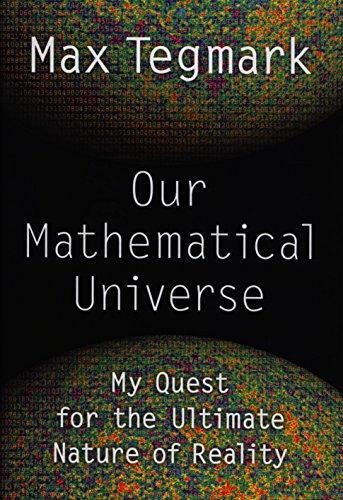Thom reviewed Our Mathematical Universe by Max Tegmark
Review of 'Our Mathematical Universe' on 'Goodreads'
4 stars
This book comes at the idea of multiple parallel universes from two angles - physics and math - without requiring a degree in either. Well written with humor, the content is easily read, but the arguments are not always so clear cut. An interesting perspective that I'm not sure I agree with.
In the first portion of the book, "Mad" Max (as he is known among physicists) lays out much of what we know about the universe, making the case actual parallel universes (as opposed to theoretical). The first chapter even contains a quick chart showing which chapters should be read by the science curious, the hard-core reader of popular science, and physicists.
In parts 2 & 3, he dives into the math, coming around to idea that math doesn't just represent the universe, but that it is the universe (a 1:1 mapping, if you will). I don't think all …
This book comes at the idea of multiple parallel universes from two angles - physics and math - without requiring a degree in either. Well written with humor, the content is easily read, but the arguments are not always so clear cut. An interesting perspective that I'm not sure I agree with.
In the first portion of the book, "Mad" Max (as he is known among physicists) lays out much of what we know about the universe, making the case actual parallel universes (as opposed to theoretical). The first chapter even contains a quick chart showing which chapters should be read by the science curious, the hard-core reader of popular science, and physicists.
In parts 2 & 3, he dives into the math, coming around to idea that math doesn't just represent the universe, but that it is the universe (a 1:1 mapping, if you will). I don't think all physical processes can be represented by math at present, but it is an interesting thought. The math that doesn't seem to fit our universe? That's for parallel universes. How many of them have life like us? Probably a very small quantity, because the physics of our universe is especially suited to our life (aka anthropomorphic). Unfortunately, the argument for this particular thought stops at this point - perhaps it was too much math for a popular book? - and this point is short of proving the assumption.
As would be appropriate in a book about life, the universe, and everything, Douglas Adams is quoted on nine different occasions. This fact comes from the solid index, which follows the extensive bibliography (sectioned by topic). Only the lack of proof of his point (and the remaining arguments built on that assumption) draws the rating down a smidge.
I added this book to my "to be read" pile roughly a year ago, and was spurred to read it by goodreads "TBR twins" program, where they pair up two people who want to read the same book. I look forward to reading Harsha's review of this same book and comparing notes.

